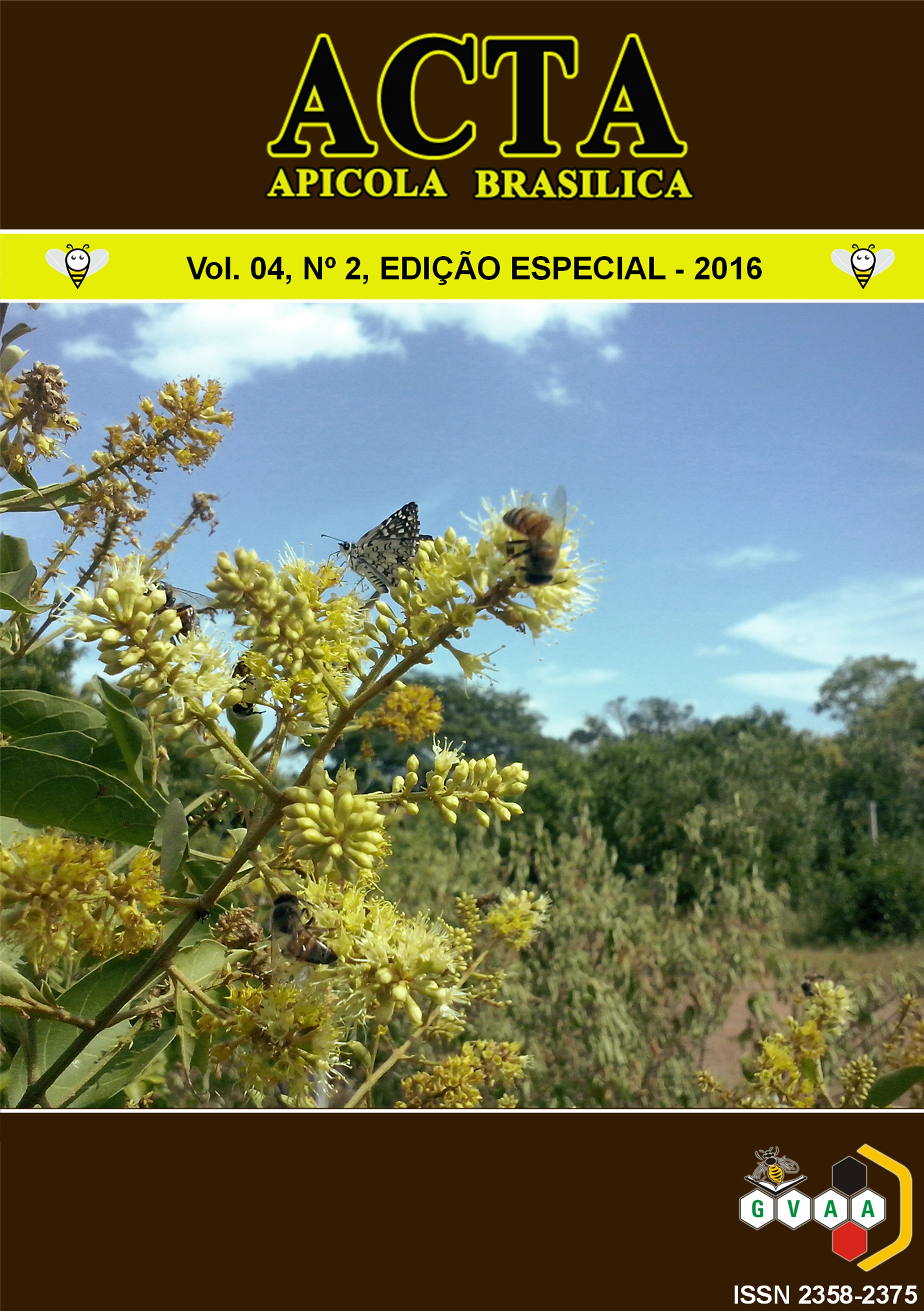Acceptance rate of Africanized honey bee larvae in hives maintained in the shade and under full sunlight in Northeast Brazil
DOI:
https://doi.org/10.18378/aab.v4i2.4648Keywords:
Queen rearing, Shading management, SemiaridAbstract
In the Semiarid region of Northeast Brazil, adverse environmental conditions such as high radiation and temperature affect the balance of homeostasis of the colonies of Africanized honey bees (Apis mellifera L.). This research aimed to evaluate the rate of acceptance of Africanized honey bees larvae (Important stage of process of queen-rearing) in hives installed in the shade and under full sunlight in the semiarid climate of Northeastern Brazil. 10 colonies of honeybees (5 in the shade and 5 under full sunlight) were orphaned and prepared with young workers and food, having standardized biomass (equal population conditions) to receive frames containing 60-100 queen cell cups with larvae up to 24 hour-old. The acceptance percentage of transferred or grafted larvae to each colony was measured 72 hours after carrying out transfers and means were compared by the Student’s t-test at 5% probability. The colonies under shade conditions showed acceptance rate of 68.82 ± 17.03%, significantly higher (P = 0.0044) than the colonies subjected to direct sunlight with only 52.13 ± 16.29%. Thus, for the production of queens and royal jelly of Africanized honeybees in the semiarid climate of Northeast Brazil, it is strongly recommended the installation of apiaries in shady locations.
Downloads
References
ALBARRACÍN, V. N.; FUNARI, S. R. C.; ARAUCO, E. M. R.; ORSI, R. O. Aceitação de larvas de diferentes grupos genéticos de Apis mellifera na produção de abelhas rainhas. Archivos Latinoamericanos de Producción Animal, v. 14, n. 2, p. 33-41, 2006.
ALMEIDA, G. F. Fatores que interferem no comportamento enxameatório de abelhas africanizadas. 2008. 130f. Tese (Doutorado em Entomologia) - Curso de Pós-graduação em Entomologia, Universidade de São Paulo.
BRASIL, D. F.; GUIMARÃES, M. O.; BARBOSA FILHO, J. A. D.; FREITAS, B. M. Internal ambience of bee colonies submitted to strengthening management by adding broods. Revista Engenharia Agrícola, v. 34, n. 5, p. 902-909, 2013.
DOMINGOS, H. G. T.; GONÇALVES, L. S. Termorregulação de abelhas com ênfase em apis mellifera. Acta Veterinaria Brasilica, v. 8, n. 3, p. 150-154, 2015.
DOOLITTLE, G. M. Doolittle’s queen rearing methods. American Bee Journal, v. 39, n. 28, p. 435-436, 1899.
FERREIRA, M. L. B.; ARNAUD, E. R.; LEITE, D. T.; SOUSA, L. C. F. S.; FILHO, R. S. Social environmental and economic study of family production of the beekeepers cooperative of Catole do Rocha- PB. Revista Verde de Agroecologia e Desenvolvimento Sustentável, v.7, n.1, p.34-44, 2012
GARCIA, R. C.; NOGUEIRA-COUTO, R. H. Produção de geleia real por abelhas Apis mellifera italianas, africanizadas e descendentes de seus cruzamentos. Acta Scientiarum. Animal Sciences, v. 27, n. 1, p. 17-22, 2005.
GONÇALVES, L. S. The big challenge: development of beekeeping with africanized honey bees in Northeast Brazil. In: Proceedings: 8th IBRA International Conference on Tropical Bees and Encontro sobre abelhas, 2004, Ribeirão Preto, SP. Anais... Ribeirão Preto: FUNPEC Editora, 2004. p. 241-246.
LOPES, M. T. R.; BARBOSA, A. L.; NETO, J. M. V.; PEREIRA, F. M.; CAMARGO, R. C. R.; RIBEIRO, V. Q.; SOUZA, B. A. Alternativas de sombreamento para apiários. Pesquisa Agropecuária Tropical, v. 41, n. 3, p. 299-305, 2011.
MEDEIROS, P. V. Q.; PEREIRA, D. S.; MARACAJÁ, P. B.; SAKAMOTO, S. M. Produção de abelhas rainha Apis Mellifera spp. (africanizadas) no Semiárido cearense, Brasil. Revista Verde de Agroecologia e Desenvolvimento Sustentável, v.6, n.5, p. 46-50, 2011.
MOURO, G. F.; TOLEDO, V. A. A. Evaluation of Apis mellifera carniolan and africanized honey bees in royal jelly production. Brazilian Archives of Biology and Technology, v. 47, n. 3, p. 469-476, 2004.
PEREIRA, D. S.; PAIVA, C. S.; BARBOSA, G. R.; MARACAJÁ, P. B.; LIMA, C. J. Produção de rainhas (Apis mellifera L.), e taxa de fecundação natural em quatro municípios do nordeste brasileiro. Revista Verde de Agroecologia e Desenvolvimento Sustentável, v.8, n.2, p.09-16, 2013.
SANTOS, R. G. Longevidade e produção de abelhas rainhas africanizadas (Apis mellifera L.) em colmeias sob condições de sol e sombra no Semiárido do Nordeste Brasileiro. 2015. 106f. Dissertação (Mestrado em Ciência Animal) – Universidade Federal Rural do Semi-Árido, Mossoró, 2015.
SEELEY, T. D. Ecologia da Abelha: um estudo de adaptação na vida social (tradução de C.A. Osowski). Porto Alegre: Paixão Editores LTDA, 2006. 256p.
SOMBRA, D. S. Monitoramento do desenvolvimento de colônias de abelhas africanizadas sobre a influência do ambiente sol e sombra na região semiárida do nordeste brasileiro (Mossoró-RN). 2013. 68 f. Dissertação (Mestrado em Ciência Animal) – Universidade Federal Rural do Semi-Árido, Mossoró, 2013.
TOLEDO, V. A. A.; MOURO G. F. Produção de geléia real com abelhas africanizadas selecionadas e cárnicas híbridas. Revista Brasileira de Zootecnia, v. 34, n. 6, p. 2085-2092, 2005.
TOLEDO, V. A. A. T.; NEVES, C. A.; ALVES, E. M.; OLIVEIRA, J. R.; RUVOLO-TAKASUSUKI, M. C. C.; FAQUINELLO, P. Produção de geleia real em colônias de abelhas africanizadas considerando diferentes suplementos proteicos e a influência de fatores ambientais. Acta Scientiarum. Animal Sciences, v. 32, n. 1, p. 93-100, 2010.
VILELA, S. L. O.; PEREIRA, F. M. Cadeia produtiva do mel no estado do Rio Grande do Norte. Natal: SEBRAE, 2002. 130 p.













